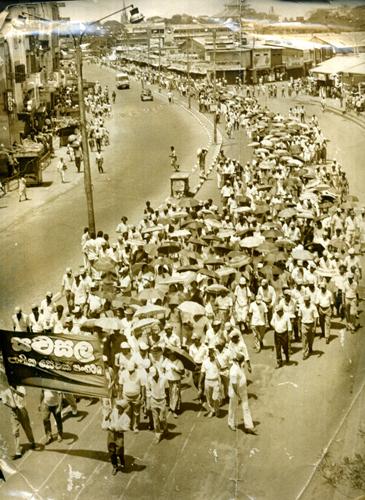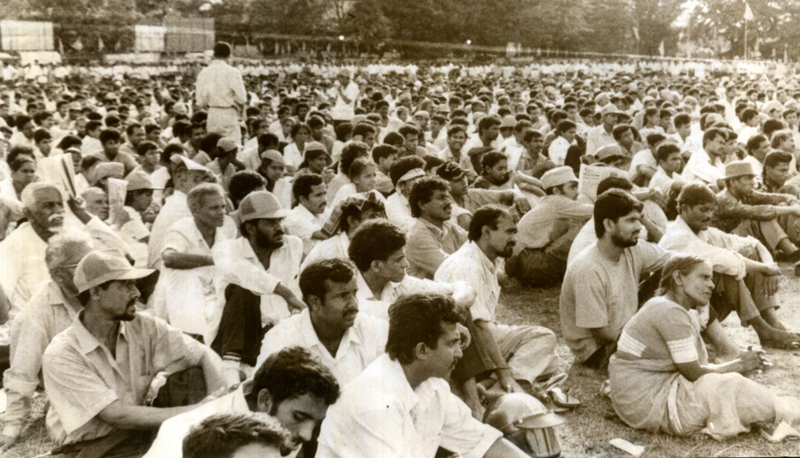
May Day was declared a holiday in Sri Lanka in 1956 for the government sector, bank and mercantile sectors. May Day celebrations have never clashed with the interests of or activities conducted during Vesak celebrations. Despite this situation and without consultation, the President has unilaterally decided to postpone May Day on the pretext that there will be a ‘Vesak Week’ this calendar year. A gazette notification issued by the Home Affairs Minister cancelled the May Day holiday which is due on May 1.
The President’s postponement of the May Day celebrations in Sri Lanka to May 7 is allegedly because of a request made by the Mahanayaka Theros. This is a crass political ploy of exploiting religious sentiment to inhibit protests of the working people by diverting their attention away from the burning issues of the day. Some parties and unions who are supposed to represent workers’ interests have already fallen in line with the government. Others have decided to take their protests to the streets on May 1, despite a Municipal ban on marches.
The issue of the overlapping of May Day with Vesak Day has arisen many times previously. The facade of religiosity becomes apparent at times when this occurs. In 1967, the UNP regime postponed May Day celebrations to May 2. As quoted in news reports, the Communist Party (Peking Wing) opposed it and Maithripala Sirisena supported the Communist Party’s decision. Now he himself is postponing May Day celebrations.
Several trade unions in Sri Lanka have strongly objected to this decision to postpone May Day, emphasizing that it is a right of workers to celebrate international workers’ day on May 1. The JVP has declared they will go ahead with the May Day Rally but will hold the Colombo rally on May 7. It is holding its May1 rally in Jaffna, which is interesting. One could question whether this option is utilized not to confront the issue giving prominence to religion over workers’ rights. According to the JVP, bringing large crowds to Colombo on May Day for celebrations would become an obstacle for Vesak celebrations that will be held in Colombo. This is not the first time the JVP seems to have wavered on this issue. In 2008, the JVP took the initiative to change the May Day from May 1 due to Vesak celebrations, by requesting the government to do so.
This year, Vesak Day does not fall on May 1. The clash is due to the declaration of a ‘Vesak Week’ this year. If the Vesak Week is turned into an annual event, it will be interesting to find out what the JVP’s position would be. One could easily interpret and equate the JVP’s position to ‘killing two birds with one stone’. Thus, they avoid having a May Day rally in Colombo on the May Day itself, despite the relevance of the International Workers’ Day to the working people of the South of Sri Lanka, many of whom reside in Colombo.
When we were released from prison in November 1977, the position of the JVP towards the mobilization of workers was to organize them in a single workers’ federation, irrespective of their individual political affiliations. The slogan was, One Trade Union for One Industry. However, this did not materialize and the JVP then formed its own trade union under the banner, ‘Socialist Workers’ Union’. This fragmentation of workers’ unity along party lines can be seen in many countries, including Sri Lanka and India.
In Sri Lanka, workers have joined ranks with capitalist political parties, such as, the UNP, the SLPP and the SLFP. Even those on the Left are associated with and scattered around many political parties and groups. These political entities, when they were in power directly or as constituents of capitalist ruling coalitions, have violently suppressed many struggles led by the workers and the youth of the country. Sectarianism among trade unions contributes to not having joint May Day events, thus contributing to the weakness of the workers’ movement. This is also one of the factors that has affected the legitimacy of the trade unions in the public eye and has contributed to the apathy of some sections of the working people.
Workers, instead of mobilizing independently to safeguard their own interests, are now paying lip service to their cause. Meanwhile, the regime is working on the advice and agenda of the IMF and the World Bank by stripping hard-earned workers’ rights, including the eight-hour working day. This situation will not change until trade unions organize on the basis of One Trade Union for One Industry, policy. At the same time, the only guarantee for such unity will be to practise democracy within trade unions.
Apparently, one of the main trade unions that allow working people with diverse political views to come together for participative decision making is the Ceylon Mercantile Union that had been previously led by the late, comrade Bala Tampoe. However, despite workers with diverse political views being allowed to join the union, I note that during his long tenure, a solid grip was maintained on the union by the General Secretary till his demise.
Thus, this Government has declared May Day a working day. Furthermore, the Colombo Municipal Council controlled by the UNP has refused to grant permission to hold May Day rallies in public parks in Colombo on May 1. This is clearly a ban on all May Day celebrations in Colombo. The sort of repressive action this government takes against those organizing May Day events on May 1, could very well be on par with the violent repressive action the previous regime took against workers’ struggles at the time. As the United States and several other countries had done, the Government of Sri Lanka seems to have come forward to openly curb democratic rights of the working people.
One could observe historic parallels, when many socialist groups came into being during the latter half of the nineteenth century. Some of them were political parties and others just choirs. Many socialists were even elected to represent their constituencies. However, big businesses and the state controlled the political process. Seeing that there was no way they could advance for a better future, many rejected the available political space, which had been designed to protect the wealthy. Most of them broke away from political organizations to become anarchists. They stressed the need for worker directed industries and cherished direct action over bureaucratic political processes.
Working people all over the world celebrate their traditions, histories and victories on May 1, every year. The socialists and communists of the Second International commemorated the Haymarket Affair in Chicago on the first of May, which became May Day, as we know it. It is now a public holiday in many countries with workers around the world, including Sri Lanka, celebrating May Day with protest rallies and marches.
Sincethe 1880s, it has been recognized as the International Workers’ Day. At the time, working class movements had been fighting for fair working conditions, including a standardized eight-hour working day and the rights of the trade unions. Under drastic and adverse working conditions, workers had to work 10 to 16-hour days with no holiday provisions. Due to unsafe work practices, death and injury were a commonplace occurrence. During this time, the working class was in constant struggle to gain an 8-hour work day. However, it was only in the late 1880s that organized labour was able to gain sufficient power to declare the 8-hour working day, without the consent of employers.
May 1, 1886, was the first May Day celebration in the world. In Chicago, 40,000 went out on strike. Parades, bands and tens of thousands of demonstrators on the streets illustrated the workers’ strength and unity. Strikers responded to police beatings by throwing rocks and the police responded with gunfire, killing several strikers and wounding many. The Chicago protests spread across Europe. Yet, many not being aware of this, believe it is a day celebrated only by the Communists and Socialists. Despite this belief, May Day has continued to be associated with the objective of achieving social and economic fairness and justice for all working people.
History teaches us that people fought for the rights and dignities we enjoy today. There is a lot more to fight for. If we remember that people were shot at, for us to enjoy the eight hour working day; if we recognize that homes were burnt down for us to have Saturday as part of the weekend; if we recollect child victims of industrial accidents who marched on the streets protesting working conditions and child labour, only to be beaten down by the police and Company thugs, only then can we understand that our current conditions cannot be taken for granted. The sacrifices so many people made cannot be forgotten. Otherwise, we would have to fight all over again to gain the very same rights our forebearers won. That is the historical lesson we need to learn when celebrating May Day, which is vital.
